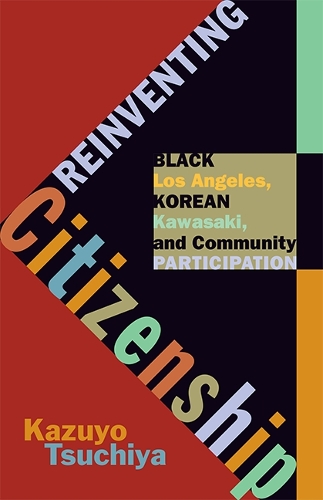
Reinventing Citizenship: Black Los Angeles, Korean Kawasaki, and Community Participation
(Paperback)
Publishing Details
Reinventing Citizenship: Black Los Angeles, Korean Kawasaki, and Community Participation
By (Author) Kazuyo Tsuchiya
University of Minnesota Press
University of Minnesota Press
24th June 2014
United States
Classifications
Professional and Scholarly
Non Fiction
Urban communities / city life
Ethnic studies / Ethnicity
361.61409794
Physical Properties
Paperback
280
Width 140mm, Height 216mm, Spine 38mm
Description
In the 1960s and 1970s, the United States and Japan went through massive welfare expansions that sparked debates about citizenship. At the heart of these disputes stood African Americans and Koreans. "Reinventing Citizenship" offers a comparative study of African American welfare activism in Los Angeles and Koreans' campaigns for welfare rights in Kawasaki. In working-class and poor neighborhoods in both locations, African Americans and Koreans sought not only to be recognized as citizens but also to become legitimate constituting members of communities.
Local activists in Los Angeles and Kawasaki ardently challenged the welfare institutions. By creating opposition movements and voicing alternative visions of citizenship, African American leaders, Tsuchiya argues, turned Lyndon B. Johnson's War on Poverty into a battle for equality. Koreans countered the city's and the nation's exclusionary policies and asserted their welfare rights. Tsuchiya's work exemplifies transnational antiracist networking, showing how black religious leaders traveled to Japan to meet Christian Korean activists and to provide counsel for their own struggles."Reinventing Citizenship "reveals how race and citizenship transform as they cross countries and continents.
By documenting the interconnected histories of African Americans and Koreans in Japan, Tsuchiya enables us to rethink present ideas of community and belonging.
Reviews
"This comparative study of community policies related to welfare and community participation is well organized, well writen, and well documented. The narrative moves along, not dwelling too long on one individual or organization, yet it also contains extremely apt quotations from policy makers and activists that vividly conveey their ideas. The attention to gender, female homemaker and male breadwinner, and contestations of that is equally efficient and well conceived, enriching the book. The influence of African Americans and their ideas on contestations over inclusion and welfare policies in Japan is equally compact and relevant." Kathleen Uno, Temple University
"A fascinating addition to the literature on the War on Poverty."Journal of American History
"Reinventing Citizenship leaves the reader with the opportunity to question how contemporary efforts to address poverty and economic inequality might resonate within a transnational context."Law, Culture, and the Humanities Journal
"Reinventing Citizenship is important for exploring the little-known differences and similarities between black welfare activists in Los Angeles and their Korean counterparts in Japan, and for its rare demonstration of the transnational ties that bound them."American Historical Review
"Reinventing Citizenship is a work of solid research, whose comparative approach compels readers to think about state welfare and social movements in the late 1900s globally and expansively, something Americanists should do more in general."Pacific Historical Review
Author Bio
Kazuyo Tsuchiya is associate professor of American history and culture in the Department of English at Kanagawa University.
